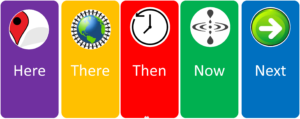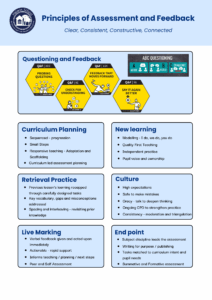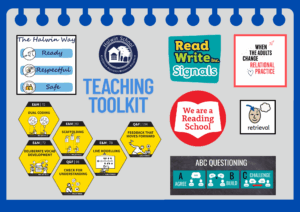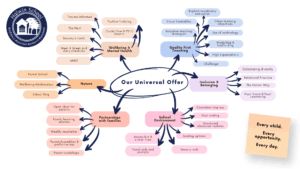Curriculum
We have designed a vocabulary rich curriculum that connects learning by building an understanding of ideas, concepts, chronology and themes through the framework of ‘here, there and then, now, next’. These thinking threads link learning meaningfully to create opportunities to learn from the past and present as well as equipping children for an ever-changing and exciting future.

It is our curriculum ambition for every child to leave Halwin School exemplifying our CARE values. Halwin citizens will be: confident, aspirational and resilient, and they will enjoy their learning journey.
Our drivers are our ‘thinking threads’ that guide our curriculum choices.
Curriculum Overview KS1 2025 2026
Curriculum Overview KS2 2025 2026
Curriculum Overview EYFS 2025 2026
At Halwin, we follow the National Curriculum and the EYFS Foundation Stage Development Matters as our main teaching framework. We teach early reading through Read, Write, Inc from EYFS. When children have completed the programme, we teach reading fluency strategies. These include echo and choral reading. Teachers explore vocabulary in every lesson and use the different question types through VIPERS to check comprehension. Teachers adapt learning with carefully constructed questions and stem sentences.
Our writing approach includes use of rich texts, high quality writing models and structured learning. Meaningful links to the wider curriculum are made, but not at the cost of subject specific disciplinary knowledge. The texts chosen also offer valuable personal and social capital.
Mastery mathematics is embedded in our lessons using Mastering Number for Reception and KS1 and Oak Academy and White Rose mathematics for KS1 and KS2. Number Sense is also utilised to support number and times tables fluency. Lessons are adapted well through variation and further scaffolded by modelling and fading.
Our curriculum is designed to ensure that children acquire essential knowledge in small steps, leading towards end points with opportunities in each lesson for reactivation and recap to help children recall knowledge. As a consequence, children use their knowledge to make links and connections and apply their understanding to other subjects, concepts and the development of skills.
We have robust teaching and learning strategies which are embedded so that they become habitual. These include ‘Cold Calling’ and ‘Agree, Build, Challenge’. Children demonstrate that they are highly engaged and responsive and enjoy the opportunity to participate fully with their peers.
For Science, we use Plymouth Science. The Plymouth Science programme provides the objectives for learning and in some areas, this is enhanced by the Ogden Trust resources and CPD. We use Oak Academy for History, Geography, Art and DT, Language Angels for French, and Kapow for PSHE, These resources provide knowledge-rich and progressive foundation subject curriculums. Small steps and vocabulary are identified and carefully chosen outcomes provide engaging learning opportunities and cross-curricular links. We use the Cornwall Agreed Syllabus alongside Understanding Christianity for R.E. and access support from NATRE with regard to knowledge and lesson planning. Complete PE comprehensively guides our physical education and sport provision. It provides teachers with step-by-step guidance and instruction to ensure children develop the skills and competencies to become increasingly active and inclusive. Digital Learning Cornwall Computing Curriculum has been adopted to provide the essential knowledge and skills needed to thrive in a digital world. It develops the necessary learning to stay safe online and use technology with increasing ability to equip children for a future that is digitally progressive. Project Evolve is also used to teach our online safety; this is carefully integrated throughout the year.
Halwin School has a supportive and thriving community ensuring strong and relevant community links. Children experience varied and exciting opportunities to foster a sense of belonging and strong cultural capital. Personal Development and social justice are very much a part of our planned curriculum and assemblies. However, we recognise the potential for isolation due to our location and have further developed our curriculum through the use of Lyfta. This 3D immersive education platform enables children to experience, virtually, places and people that they would not otherwise meet. Thus, ensuring that we educate and embrace cultural diversity, social change, prejudice, and equality, preparing children for a future that is respectful, caring and hopeful.
Our curriculum is underpinned by consistent approaches to teaching, assessment, and pupil wellbeing. These are captured in three key frameworks:
– Principles of Assessment and Feedback, which ensure clarity, consistency, and responsiveness in learning;
– the Halwin Teaching Toolkit, which guides high-quality classroom practice through strategies such as modelling, scaffolding, and relational practice;
– and Our Universal Offer, which promotes inclusion, wellbeing, and strong family partnerships.
Together, these ensure that every child at Halwin School is supported to thrive academically, socially, and personally.



